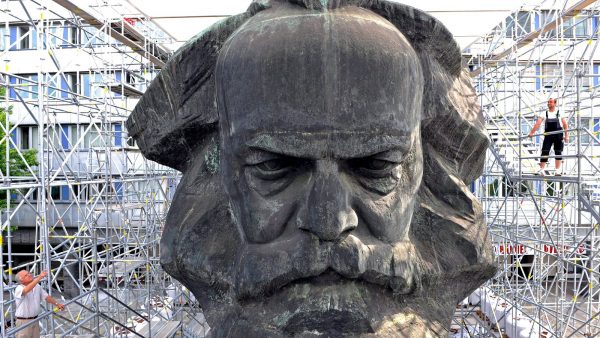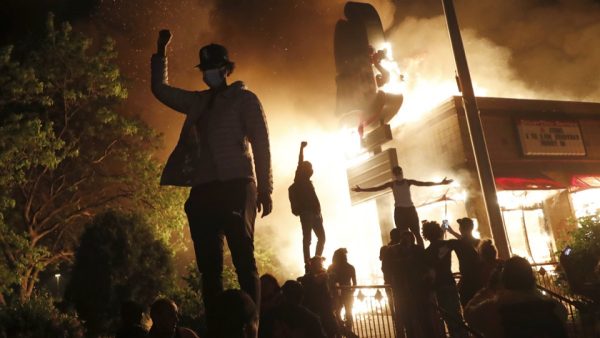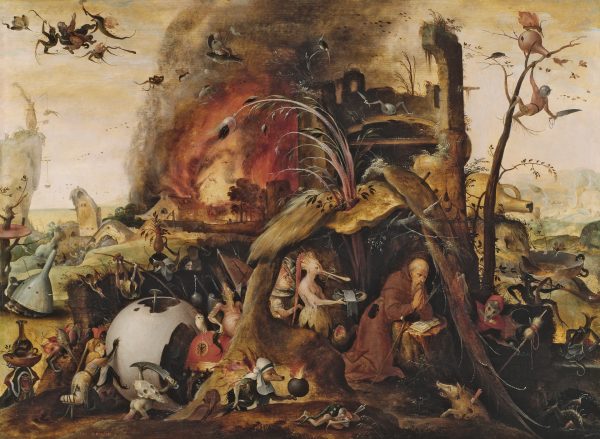South Africa's radical decolonization efforts are an abject disaster.
Armageddon Now

Unless all lives matter, none does.
Is the Black Lives Matter (BLM) movement Marxist? Its leadership says that it is. And it certainly has infused new energy into the International Marxist Tendency (IMT), which triumphantly posted on its website, “[c]omrades of the IMT have taken part in demonstrations in countries such as: the USA, Canada, Britain, Belgium, Mexico, Switzerland, Italy, Denmark, Germany, Greece and Sweden.”
Labels aside, however, whether most marchers holding BLM posters ever heard of IMT, let alone belong to it, they share its goals. For BLM’s “intention from the very beginning was to connect Black people from all over the world who have a shared desire for justice to act together in their communities.” Its proclaimed aim has always been to ignite “ideological and political intervention in a world where Black lives are systematically and intentionally targeted for demise.”
The basis for Alexandra Phillips’s claim, in the London-based Telegraph, that “BLM happily self-identifies as a neo-Marxist movement with various far left objectives, including defunding the police (an evolution of the [Black] Panther position of public open-carry to control the police), to dismantling capitalism and the patriarchal system…” is BLM’s own website.
“Neo-Marxist” is accurate. What unites woke radicals is a hatred of evils it identifies as racism, inequality, Zionism, sexism, which are all presumably caused by capitalism, currently epitomized above all by America, with Israel close behind. And since evil must be eradicated, the self-appointed heralds of a blissful Eden are prepared for the big fight. Their message is visceral, inflaming passions rather than offering policy options based on empirical research. Perhaps for that very reason, Marxism continues to appeal to an increasingly influential segment of the Western-educated elite. All the more reason to return to the original sources rather than merely, lazily, fall back on ambiguous, emotion-laden labels.
The Big Lie
Though largely ignored at first, Karl Marx’s brilliant rhetoric eventually came to dominate global political discourse. His genius lay in updating the traditional millenarian trope of pitting the Antichrist-Messiah, the damned and the saved “contradiction” into a narrative of class struggle between the haves and the have-nots which can only end after an Apocalyptic Explosion that eliminates selfishness and greed by abolishing inequality and private property. The Explosion and its aftermath, moreover, are justified by the eventual utopian outcome: in brief, what must be, should be.
At the final redemption, all coercion will come to an end: “Once class distinctions have disappeared, and all production has been concentrated in the hands of a vast association of the whole nation, the public power will lose its political character…. [For it will be] an association in which the free development of each is the condition for the free development of all” (Ch. 2). Not “might”—“will.” For as soon as a new, altruistic human emerges and everyone desires the common good, the state becomes superfluous. There will be no factions.
True, the explosion (i.e., revolution) won’t be especially pretty; for “of course, in the beginning, [the revolution] cannot be effected except by means of despotic inroads on the rights of property, and on the conditions of bourgeois production.” But never mind the details. Marx saw his job as providing a rationale for inspiring upheaval, not drafting a practical program. On the contrary.
As he explained in a letter dated February 22, 1881, “[t]he doctrinaire and necessarily fantastic anticipation of the action for the future revolution is only used as a distraction from the present battle. The dream of the imminent end of the world inspired the early Christians during their struggle against the Roman Empire and gave them faith in their victory,” and so it would again. That dream is important in harnessing the masses’ holy anger to bring about the inevitable Final Battle.
Which is bound to come; for the masses’ ever-growing passion, alongside “the inevitable disintegration of the dominant order of society” and “the positive development of the means of production advances with gigantic strides” together provide “a sufficient guarantee that with the moment of the outbreak of a real proletarian revolution there will also be given the conditions (though these are certain not to be idyllic) of its next immediate modus operandi.”
Certain not to be idyllic. The sinister understatement is the direct result of the most egregious logical sleight-of-hand in history: if something is necessary, it must be done: so the descriptive becomes the moral. By conflating what-is with what-should-be—in logician’s lingo, the is-ought fallacy—the conclusion flows naturally: if revolution is bound to arrive, therefore it is right. So does the final post-revolutionary vision of a stateless, uncoercive heaven-on-earth justify the means of its own achievement. If these require violence, so be it. Welcome to the Big Lie. Far from withering away, the state became omnipotent.
Except that Mikhail Bakunin (1814-1876), leader of the Russian anarchists, disagreed: “The Communism of Marx wants a mighty centralization by the State, and where this exists there must nowadays inevitably be a Central State bank, and where such a bank exists, the parasitical Jewish nation, which speculates on the labor of the people, will always find a means to sustain itself.” Bakunin’s anti-Semitism extended to Marx, notwithstanding the latter’s childhood conversion to Christianity, later repudiation of all religion, and his anti-Semitic conflation of Judaism with capitalism in On the Jewish Question (1844).
It fell to the ruthless genius V.I. Lenin (1870-1924) to respond. In The State and Revolution (1917), Lenin accuses Bakunin of “the crudest distortion” of the Marxist conception. “[I]n speaking of the state ‘withering away,’ and the even more graphic and colorful ‘ceasing of itself,’” explains Lenin, “Engels refers quite clearly and definitively to the period after ‘the state has taken possession of the means of production in the name of the whole of society,’ that is, after the socialist revolution.” Why quibble about timing? “Revolution alone can ‘abolish’ the bourgeois state. The state in general, i.e., the most complete democracy, can only ‘wither away.’” It can do nothing else: history unfolds as it must.
Lenin’s casuistry is impressive. He glosses over the fact that Marx said that immediately after the revolution the intermediary stage was a putatively “complete democracy,” which Bakunin had the foresight to fear. Lenin knew well that Bakunin had been right; nonetheless, the mantra that abolishing private property and confiscating “the means of production in the name of the whole of society” would eliminate the state was not to be questioned.
If we don’t know what such an intermediary-yet-complete democracy will look like, Lenin explains what it cannot be—namely, “a state which recognizes the subordination of the minority to the majority,” which entails “the systematic use of violence by one class against another,” because if classes no longer exist, neither does violence. Cautiously, he describes the revolution’s immediate aftermath with double negatives: “We do not expect the advent of an order of society in which the principle of the subordination of the minority to the majority will not be observed.” So, if we do not “expect” that the principle of subordination will not be observed, it follows, however tentatively, that it will be. The words twist the brain into silence, defeated by the logic of historical necessity. The majority will, because it must, prevail over the minority, and it won’t take too long before even the slightest tiny, quite negligible, remnant of a state disappears altogether.
For “in striving for Socialism we are convinced that it will develop into Communism and, hence, that the need for violence against people in general…will vanish altogether since people will become accustomed to observing the elementary conditions of social life without violence and without subordination.” Invoking Engels’s vision of a new generation “reared in new and free social conditions,” Lenin lets it slip in that “the need for violence” will vanish. But why the tentative “we are convinced”—isn’t it determined? A sliver of candor pierces through the ideological carapace. The vanguard knows more than it tells.
Lenin’s next task was to find ways to sanctify his small cadre of messiah/inquisitors who would manage the details, which mandated the elimination of dissenters. The “scientific” basis of dialectical materialism required that where conditions for revolution did not yet exist, they had to be created, and all obstacles to the eventual success of socialist utopia had to be eliminated. As Bertrand Russell observed in 1896, “Marx’s system…is a real religion and it cannot be tolerant of other religions. Just as much as early Christianity, Social Democracy is logically forced to break with all existing faiths, and if it did otherwise, it would lose much of that imposing emotional effect which it derives from its systematic completeness.” A century later, these words ring truer still.
What Comes Next?
But what makes the Marxist narrative exponentially more powerful than its ecclesiastic rivals is the same dualist dialectic that allows it to get away with, well, murder. For whether any BLM members, sympathizers, or just fellow-marchers are even vaguely aware of the underlying millenarian sophistry, so long as they contribute to the “inevitable” Armageddon, they’re on the right side of history. Idealistic students, thugs looking for loot, pro-Palestinian activists: the wave is inclusive.
Latest on the bandwagon are the capitalists themselves. Writes Member of the European Parliament Alexandra Phillips: “The rapid spread of protests across the West under the Black Lives Matter banner has left a political breathlessness from Baltimore to Berlin…. In a world where nothing is exempt from moral judgment, being on trend means signing up to radical political movements.” And après nous, l’apocalypse….
The abolition of “class inequality” has served as the secular equivalent of Paradise for over a century, its resistance to refutation categorical. But the continuing appeal of revolutionary absolutism is evidence of a deeply entrenched need to feel virtuous by seeking an apocalyptic erasure of “systemic inequality,” by demonizing particular classes. What fellow travelers hoping to be spared fail to realize is that unless all lives matter, none does.
The American Mind presents a range of perspectives. Views are writers’ own and do not necessarily represent those of The Claremont Institute.
The American Mind is a publication of the Claremont Institute, a non-profit 501(c)(3) organization, dedicated to restoring the principles of the American Founding to their rightful, preeminent authority in our national life. Interested in supporting our work? Gifts to the Claremont Institute are tax-deductible.
Woke aggression won’t stop with speech.
We've honored a slave-trading tyrant for far too long.
It’s leftists, not Christians, who should be accused of fatalism.
A vengeful quest for social purity ends only in public ugliness.
Today’s miseducated fame-seekers can’t lead us, unless it’s off a cliff.






